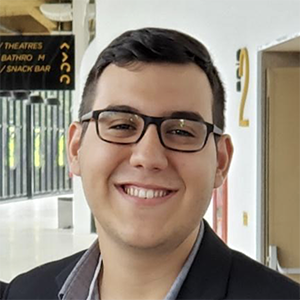ACC Medical Student Spotlight: Eduardo Thadeu de Oliveira Correia

Eduardo Thadeu de Oliveira Correia is an MD/PhD student from the Fluminense Federal University, in Rio de Janeiro, Brazil, expected to graduate with his medical degree at the end of this year and defend his PhD thesis in 2022. Since the beginning of medical school, he has been passionate about the cardiovascular system, its physiology, and the pathophysiology of diseases. The field of cardiology caught Eduardo's attention early on due to its active transformation, with numerous trials published every year to provide evidence for physicians to practice the best care possible.
Having had the opportunity to witness vast transformations in cardiovascular care, he was inspired to become involved with cardiovascular research and try to make his own contribution to the field. With a bit of luck and a lot of hard work, Eduardo was able to find brilliant clinical and research mentors that have contributed to his growth as a future physician-scientist (Evandro T. Mesquita, MD; Ronaldo Altenburg Gismondi, MD; and Antonio Jorge, PhD). After learning the basics of research,1 he has had the opportunity to write and publish meta-analyses, population-based studies, viewpoints, and reviews on many PubMed-indexed journals on a variety of topics (e.g., left atrial abnormalities, heart failure phenotypes, suggestions for new Brazilian heart failure guidelines, and strategies to reduce the burden of cardiometabolic diseases). These contributions to the literature have been internationally recognized and led Eduardo to serve as a moderator at a National-Level Heart Failure Congress and was invited to be a peer reviewer for multiple national and international journals. Beyond these accomplishments, all of Eduardo's work has helped him shape his clinical practice in medical school and taught him fundamental rules, including:
- The importance of not only reading but also appraising a research paper
- The impact of applied evidence-based, individualized, and humanized medical care in clinical practice
- How medicine requires passion and dedication to be as up to date as you possibly can
Following these achievements, Eduardo joined the Cardiovascular Disease PhD program at Fluminense Federal University and now is on the path to becoming one of the youngest PhDs in Brazil, at 24 years old. Eduardo credits Claudio Mesquita, MD, FACC, for building the MD/PhD program at their institution. Importantly, the PhD program has helped Eduardo focus on a research line (preventive cardiology) and find a new mentor that he has been honored to work with for the past year (Jeffrey Mechanick, MD). With this collaboration, their group has had the opportunity to publish a paper that discusses the creation of a new medical residency in Brazil: The Cardiometabolic Medicine Residency.2 Eduardo is certain that this new residency program will make a profound impact on cardiovascular care in Brazil and will likely also reduce its associated costs. In addition, he has joined a research network with inspiring scientists from all over the world that work with one guiding principle in mind: to provide evidence-based recommendations to improve cardiometabolic-related health care across different ethnocultural populations.3
"Cardiology and cardiovascular research is a hard but rewarding field to work in. The possibility of practicing evidence-based and humanized care pushes me forward to join an internal medicine residency and further down the line, a cardiovascular disease fellowship. Moreover, the ability to change health care and improve patients' outcomes around the globe is unparalleled and motivates me to work towards becoming a physician-scientist. Finally, to medical students out there that want to take their first steps in cardiovascular research, remember that setbacks and rejections are normal in science. To thrive in this scenario, you must keep an open mind, accept each failure as a learning experience, and, above all, enjoy the process."
— Eduardo Thadeu de Oliveira Correia @eduardotcorreia
"It is an absolute pleasure to feature Eduardo for our first ACC Medical Student Member Spotlight Series – we couldn't have been more impressed and inspired. Congratulations Eduardo, we wish you best of luck on your future endeavors!"
— ACC Medical Student Leadership Group Editorial Team

Evandro T. Mesquita MD, PhD; Letícia Barbetta, MD/PhD student; and Eduardo, at the 2019 Brazilian Heart Failure Congress where Eduardo served as a moderator.
References:
- Correia, ETO. Advice to Medical Students Stepping Into Cardiology Research [Internet]. American College of Cardiology. [cited 2021 Sep 10]. Available from: https://www.acc.org/Membership/Sections-and-Councils/Medical-Students/Section-Updates/2020/09/09/13/35/Advice-to-Medical-Students-Stepping-Into-Cardiology-Research.
- Correia ETO, Barbetta LMS, Toledo MA, Mesquita ET, Mechanick JI. Medical Residency in Brazil in the Era of Chronic Diseases: The Need for Cardiometabolic Medicine Residency. Arq Bras Cardiol. Forthcoming 2022.
- The MEchanick Transculturalization Research and Innovation ConSortium [Internet]. METRICS. [cited 2021 Sep 25]. Available from:https://metricscm.com/.

